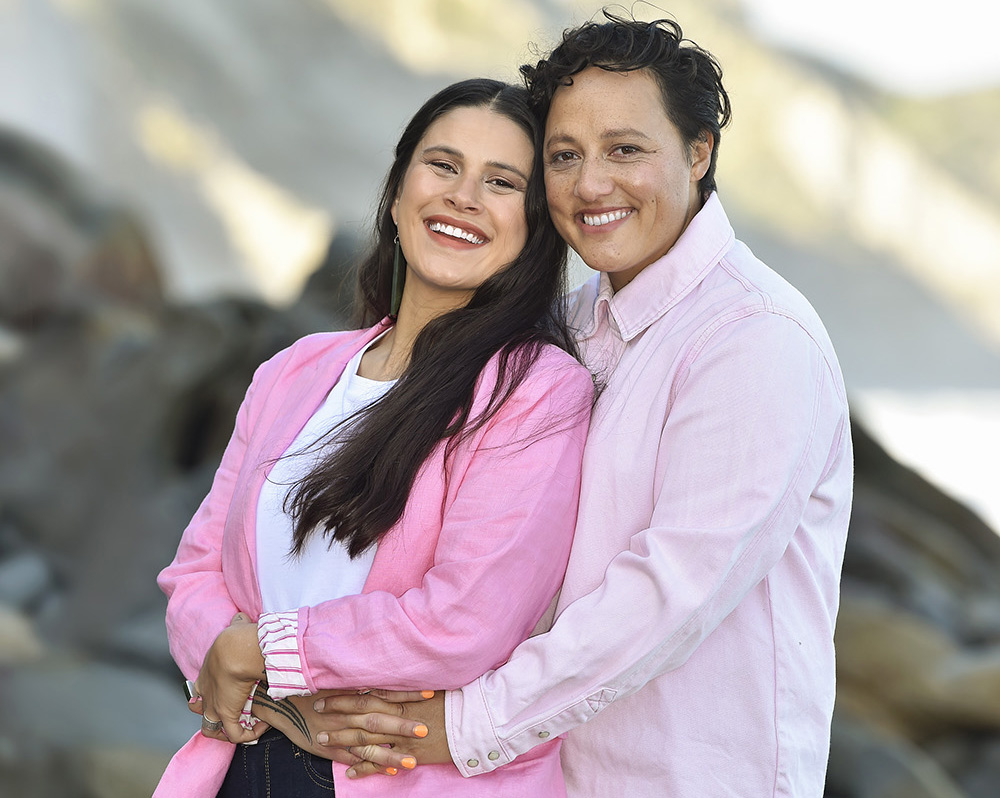Things are getting loud at Kiritapu Allan’s place in Gisborne. The kids are singing so enthusiastically, the Labour MP has to move outside and sit in the sunshine, where she can make herself heard. We get the feeling this isn’t the first time she’s been ousted from her own living room.
Family life is both beautiful and messy for Kiri and her partner of three years, Māni Dunlop. Both juggle parenthood with full-on careers – Māni as a presenter on RNZ National, and Kiri now our Minister of Justice, previously serving as our Minister for Conservation and Emergency Management.
They live between the East Coast and Wellington with their blended family that also includes daughters Pikiarero Hazel, four, and Hiwaiterangi Allan-Coates, four and a half.

Māni and Kiri are keen for daughters Pikiarero (left) and Hiwaiterangi to have more siblings.
“There’s no typical day for us,” admits Kiri, who is divorced from her former partner, lawyer Natalie Coates. “We manage to raise our children with a big colourful tribe of people who are a huge part of our lives. We’re fortunate with the family support we have wrapped around us.”
Politics is a challenging career and Kiri is in no doubt that being with family is the best way for her to recharge. “This is the place that grounds me,” she explains. “Those kids who were singing those beautiful songs – everything is really focused around them having a good life. I’m lucky that they allow me to come home and for it to be a soft place to land, where I can curl up in a corner if I need to. It’s family that gives me sustenance.”

One of their joys as a whānau is to get out into nature. In the summertime, that means lots of time at the beach, swimming, fishing and diving.
“Recently, I took my eldest girl for her first hike – just a small one, but it was an overnighter and she had to carry her own pack,” tells Kiri. “Both girls have their own tramping boots and hiking packs. Being out in the bush is so great for them and we tell them all the time that they’re incredibly privileged they get to see these beautiful places.”
Time with her family is all the more precious because Kiri, 38, came so close to losing it. Early last year, she was diagnosed with stage 3 cervical cancer and knew that as a Māori woman, she was 2.5 times more likely to die. What followed was the fight of Kiri’s life as she underwent medical treatment.

Fortunately, in December, she announced she was cancer-free, although she will need to be monitored for the next five years in case it returns.
“It’s been a tough year – I can’t lie about that,” Kiri tells. “But the journey I’ve been forced to go on has also been an incredible gift. When you’re right on the brink of thinking you’re not going to be here for very much longer, you have to be pretty frank with yourself about who you are, what’s important and what drives you.
“I feel like I’ve been through a bit of a rebirth and a reset. Things that were important maybe aren’t so much now. One of the reflections that I came away with after my wee journey was that I’m incredibly lucky to be in the role I’m in, so I’d better run hard while I’ve got the ball and do everything in my power to change people’s lives for the better.”

Hiwaiterangi has already had her first sleepover in the bush with her mum, who is of Ngāti Ranginui and Ngāti Tūwharetoa descent.
Working in politics is never smooth going and young MPs can go in full of hope for change and be frustrated by everything they can’t do. But surviving cancer has confirmed to Kiri that she is in the right place and doing what she is meant to.
“I’ll run hard,” says Kiri.
“And if these legs give up and I can’t run hard any more, then I’ll pass the ball on to the incredible crew of people coming through from the generation behind me. I’m sure there’ll be other things I’ll find myself doing, whether that’s gardening or fishing, who knows?”
One achievement she is proud of is her role in the creation of a new public holiday to mark Matariki, the rising of a cluster of stars that signals the start of a new year for many Māori. For the first time ever, this year, on 24 June, New Zealanders will have a day off work to celebrate.

Sworn in as an MP, with the PM and Dame Patsy Reddy.
“Matariki is a time to reflect on where you have come from in the past year,” explains Kiri. “It’s also about looking at where you are now and taking time to think about where you want to be in the year ahead.”
Across the country, people will be marking the occasion with feasting, music and stories. As Minister for Conservation, Kiri hopes it will be a time for us to put energy into the land, planting trees, restoring waterways and caring for our environment.
Matariki also has a personal significance for her, which is tied up in the name of her and Māni’s children. “Hiwaiterangi is the youngest of the nine Matariki stars,” she explains.
“My daughter’s name literally means to cast forth your intent for the year ahead.
“And Pikiarero is the daughter of Puanga. Some tribes recognise Matariki and some recognise Puanga as the star that is the reference point for the new year ahead. So we have these babies that are literally little stars.”
Having recently recovered from a bout of COVID, Kiri won’t be spending the national holiday with family this time, but alongside the Prime Minster and other politicians at the official celebrations in Wellington.
“We’ll be up at 4am, looking into the stars and saying prayers,” she says. “I’m really excited about it. I feel like this is New Zealand maturing as a nation, and I’m really hoping people lean into it and get
out there to commemorate and celebrate.”

Jacinda has been supportive of Kiri through her cancer battle. “She cares about her crew,” says the MP.
When she’s reflecting on the past year during Matariki, Kiri won’t only be thinking about the health scare she has survived, but also the hardship her community in Gisborne has been through with deluges, floods and evacuations.
“Climate change is having such a tangible impact on people’s lives right now,” she says. “Up the East Coast, I’ve literally got nannies who have been flooded out of their houses and lost everything twice in one year. These are unprecedented weather disruptions and we’ve got some major challenges ahead of us.”
Although she is passionate about her job, Kiri never set out to be a politician. She’s a working-class girl – her father was a freezing worker and her mum a cleaner in a rest home. But while she was studying law and politics at Victoria University, she went along to a Labour Party meeting. There, she met some of the people who have since encouraged her to make politics a career. Among them was Jacinda Ardern, a woman Kiri both admires and considers a friend.
“Some people can present as one thing and be quite different behind closed doors, but she’s very genuine. I’ve found her to be humble, courageous, strong, wise and funny – a collection of incredible attributes. And yes, we’re mates, we’ve known each other for a while and our daughters are the same age.”

Hands-on in Napier after the floods.
When Kiri was ill, the Prime Minister was incredibly supportive and even while busy on her recent official visit to the US, Jacinda found time to send an encouraging text on a day when she knew Kiri probably needed it. “She genuinely cares about her crew.”
Like many high-profile women, they have both had to learn how to deal with abuse from some sectors of the public.
“Whether it’s racism, sexism, homophobia or just anti-government, we get everything from death threats to being followed around,” says Kiri. “That’s not OK and it’s not right, but you do have to take it on as part of the role.
“It can be heartbreaking for the people who love you – my mother has been distraught at the vitriolic hate directed our way – but I try not to dwell on that stuff too much because if you do, you can really lose your sense of self.”
Kiri’s sense of self has been forged under some difficult conditions. Growing up, religion formed an important part of her life and her family were Pentecostal Christians. When Kiri realised she was gay, the church community put her through a form of conversion therapy, with prayer meetings and the laying on of hands to drive the devil out.
“I ended up having quite a scarred relationship with the church. Me and my parents also had to re-navigate my relationship with God, and with the church. That took time.”
Kiri still describes herself as a “person of faith” and says it continues to be an important part of her life, but she now follows the teachings of the Rātana Church.
“I love the way I grew up, how we came together as communities and our shared sense of philosophy,” she says. “But I’m not pushing religion on to the kids – they’ll choose their own faith journeys.”
This Matariki holiday, when Kiri spends time reflecting on what she is hoping for in the year ahead, family will be central to her thoughts. She and Māni have been making plans.
“We definitely want more babies – that’s on the cards,” laughs Kiri. “And I think someone would like a wedding, but we’ll see!”
About 160 Kiwis develop cervical cancer every year and 50 die from it. The NZ Cervical Screening Programme recommends smear tests every three years from age 25 to 70. For more info on how to book yours, visit timetoscreen.nz or phone 0800 729 729.
 Rebecca Grunwell
Rebecca Grunwell

